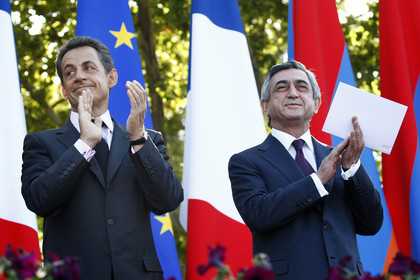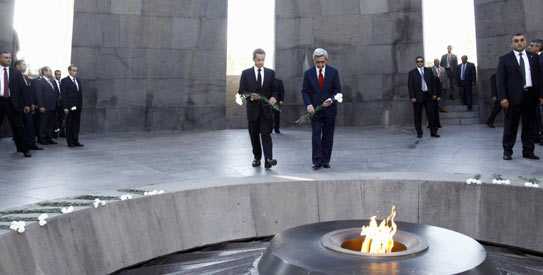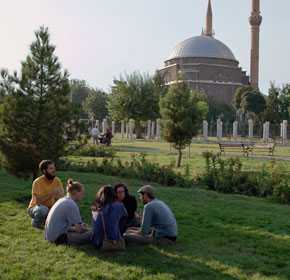YEREVAN – French President Nicolas Sarkozy urged Turkey on Friday to recognise the World War I-era massacres of Armenians as genocide within a “very brief” period before his term ends in May 2012.
“From 1915 to 2011, it seems to be enough (time) for reflection,” Sarkozy told reporters in Yerevan on the second day of his visit to Armenia.
Speaking alongside his Armenian counterpart Serzh Sarkisian, he noted however that “it is not up to France to give an ultimatum to anyone”.
Sarkozy on Thursday urged Turkey to “revisit its history” over the killings of hundreds of thousands of Armenians under the Ottoman Empire, calling its refusal to recognise the deaths as genocide as “unacceptable”.
The French president said that if Turkey did not make this “gesture of peace” and “step towards reconciliation”, he would consider proposing the adoption of a law criminalising denial of the killings as genocide.
He said that he was still hoping that Turkey would act before the end of his term in office.
Sarkozy angered Turkey ahead of his election in 2007 by backing a law aimed at prosecuting those who refused to recognise the massacres as genocide.
The French lower house of parliament later rejected the measure, infuriating the Armenian diaspora in France which is estimated at around 500,000 people.
Armenians say that up to 1.5 million of their kin fell victim to genocide during World War I under the Ottoman Empire.
Turkey counters that 300,000 to 500,000 Armenians and at least as many Turks died in civil strife when Armenians rose up against their Ottoman rulers and sided with invading Russian forces.
Sarkozy has also indicated his ambition to bring Armenia and neighbouring Azerbaijan forward in the stalled peace process over the tiny Nagorny Karabakh region, the focus of a bitter territorial conflict since the fall of the Soviet Union.
On the eve of his arrival, the French leader urged the two rivals to “take the risk of peace”.
At the joint news conference in Yerevan, Armenian leader Sarkisian responded by saying that he appreciated France’s efforts to establish “a durable peace”.
“President Sarkozy’s personal involvement in this process is particularly important to us,” Sarkisian said.
But in a sign of continuing tensions along the Karabakh frontline, two Azerbaijani soldiers and one Armenian serviceman were reported to have been shot dead in exchanges of fire the day before Sarkozy arrived.
Seventeen soldiers have now been reported killed this year around Karabakh, which Armenian separatists backed by Yerevan seized from Azerbaijan in a war in the 1990s that left some 30,000 dead.
Despite years of talks since the 1994 ceasefire, the two sides have yet to sign a final peace deal.
Sarkozy was due to arrive in Azerbaijan after leaving Armenia and then to end his two-day swing through the Caucasus with a visit to Georgia.
via Sarkozy urges Turkey to quickly recognise Armenia ‘genocide’ | Pakistan Today | Latest news, Breaking news, Pakistan News, World news, business, sport and multimedia.






